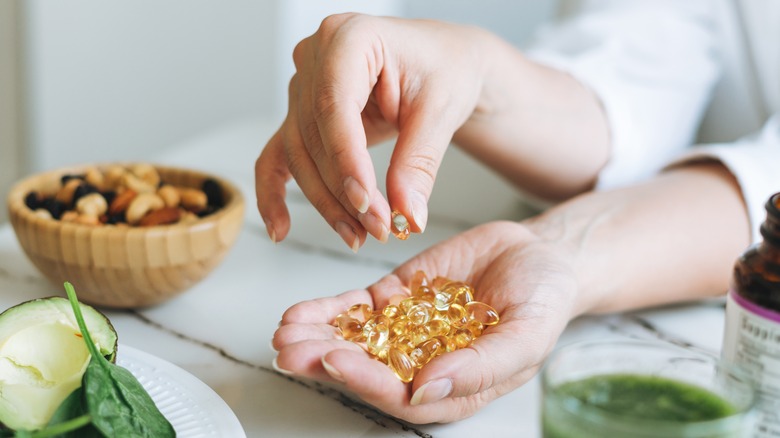The Most Unregulated Vitamins On The Market
It's best to get all of our nutrients from food, but with our busy lifestyles — and fast food so easily accessible — it's hard to get all of our nutrients from our diet. Of course, our body needs certain types and amounts of vitamins and minerals regularly to function properly. Per Global Health & Pharma, every person has a recommended daily amount of all essential vitamins for specific reasons. The body needs vitamin D to help it absorb calcium, for example. According to Verywell Health, calcium then helps strengthen bones and protect muscles. Vitamin D helps regulate calcium to support the immune and nervous systems, too (via Medical News Today).
According to EatingWell, over 80,000 different dietary supplements are available in the market. Unfortunately, the supplement industry is not regulated by the U.S. Food and Drug Administration. Since supplements aren't regulated, you shouldn't buy them without doing your own research to see whether they're beneficial for you. After all, some supplements could be unsafe. Fortunately, one way to tell whether a supplement is safe is by checking the OPSS Scorecard, which is based on seven yes-no questions created by the Department of Defense's Operation Supplement Safety program.
One such example is St. Johns Wort, which supposedly helps with depression. However, an issue of Clinical and Experimental Pharmacology and Physiology reported that this herbal supplement is not FDA-approved, and can cause side effects like panic attacks and spikes in blood pressure (via CBS News).
Every vitamin supplement on the market is unregulated
Ample research should be done before you take supplements. "Consumers should expect nothing from [supplements] because we don't have any clear evidence that they're beneficial, and they should be leery that they could be putting themselves at risk," S. Bryn Austin, a professor of behavioral sciences at Harvard, told Business Insider. According to the outlet, the $37 billion supplement industry is hardly regulated, so next time you walk down the pharmacy aisle, make sure to use the OPSS Scorecard to check if the vitamins are worth your money — and not dangerous. The only regulated and FDA-approved vitamins are the ones you get by prescription (via Live Strong).
The National Center for Complementary and Integrative Health says that vitamins A, C, D, E, and K, along with B vitamins, are essential for the body, but the multivitamins you get at the store as a dietary supplement don't show any evidence of overall better health or disease prevention. Instead, they shared that high doses of vitamins C and E could progress age-related muscle degeneration. According to the Mayo Clinic, vitamin E can increase prostate cancer when consumed through supplements, and Drugs.com shared that too much vitamin A can cause birth defects in pregnant women. As with any medical decision, you should consult a physician before adding any vitamin supplement to your diet.
Taking unregulated supplements can be dangerous
Most people assume that taking herbal supplements is good for their health, and do not consider them to have adverse effects. Well, think again. One of the most popular herbal supplements, St. John's Wort, can reduce the effectiveness of other regulated medicine like antibiotics, according to the National Center for Complementary and Integrative Health. For example, a new mom's baby had to be "quarantined" because she developed tuberculosis while pregnant, and was prescribed preventative antibiotics. However, they didn't work because she was taking St. John's Wort, too (Business Insider). "It basically overmetabolized the antibiotics, so they weren't in her system in the correct dose," Pouya Jamshidi, a resident at Weill Cornell Medical College, told Business Insider.
Some might rather take a pill for weight loss, too, so when Dr. Oz featured garcinia cambogia in 2012, everyone jumped on this bandwagon (via Healthline). According to The Health Board, hydroxycitric acid (HCA) is the component extracted from garcinia cambogia that supposedly suppresses appetites and burns fat. Still, most studies have not been able to prove it, so these supplements were taken for naught.
An example of an herbal stimulant gone horribly wrong is ephedra, which was popular in the 1990s but was banned in 2004 because it led to strokes, heart attacks, and death for some (via Strive Pharmacy). Ultimately, you should simply be careful of the supplements you take. Vitamins and supplements are both largely unregulated, so do plenty of research first.


